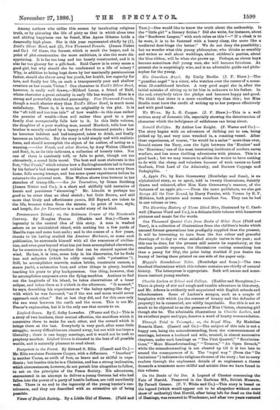Among authors who utilise this season by inculcating religious truth,
or by picturing the life of piety as that in which alone true and abiding happiness can be found, Miss Agnes Giberne holds a
deservedly high place. She is this year represented chiefly by (1), Enid's Silver Bond, and (2), Fire Thousand Pounds. (James Nisbet and Co.) Of these, the former, which is much the larger, and in point of plot-construction the more ambitious, is also the more dis- appointing. It is far too long and too loosely constructed, and it is also far too gloomy for a gift-book. Enid Carew is in every sense a good girl, but why should she be condemned to a life of misery ? Why, in addition to being kept down by her maniacally parsimonious father, should she throw away her youth, her health, her capacity for love, and finally her life, on such a transparently poor and shallow creature as her cousin Vivian ? One character in Enid's Silver Bond, however, is really well drawn,—Mildred Lucas, a friend of Enid, whose character a great calamity in early life has warped. Hers is a strong and powerfully sketched personality. Five Thousand Pounds, though a much shorter story than Enid's Silver Bond, is much more satisfactory. There is, it is true, no originality in the plot. It is the "oft told and too true tale" of how wealth—in this case rather the promise of wealth—does evil rather than good to a poor family that unexpectedly falls heir to it. In this little volume, the daughter of a poor working man, named Murdock, tells how her brother is morally rained by a legacy of five thousand pounds ; how he becomes indolent and bad-tempered, takes to drink, and finally becomes an imbecile. But the story is told simply and with realistic force, and should accomplish the object of its author, of acting as a warning.—Our Frank, and other Stories, by Amy Walton (Blackie and Son), is, as its title indicates, a collection of homely tales. Not one of them is carelessly told, or fails to point, though not too obtrusively, a sound little moral. The best and most elaborate is the first," Our Prank," which relates how a Buckinghamshire lad is forced by his father's bad temper and unkind treatment to run away from home, falls among tramps, and has some queer experiences before be returns to the paternal nest. Miss Walton shows true humour in her sketches of tramp-life.—See for Yourselves, by Grace Stebbing (James Nisbet and Co.), is a short and skilfully told narrative of heroic and persistent "slamming." Mr. Lincoln is perhaps too good to be other than an ideal sketch ; but little Brown, and still snore that lively and affectionate gamin, Bill Bayard, are taken to the life, because taken from the streets. In point of tone, style, and length, See for Yourselves is a model story of its kind.






































 Previous page
Previous page